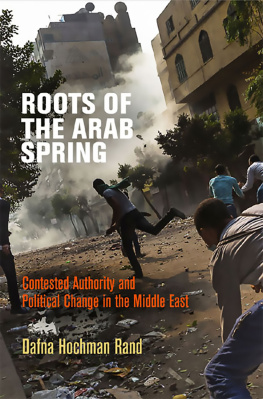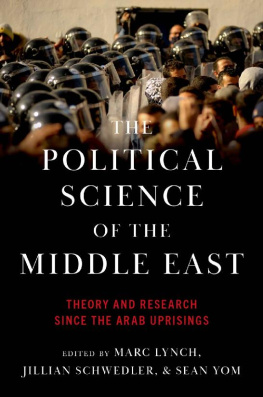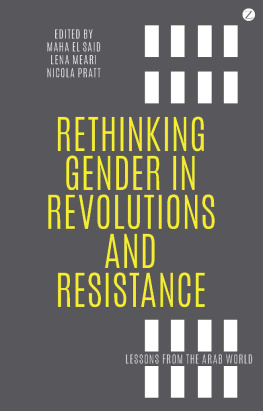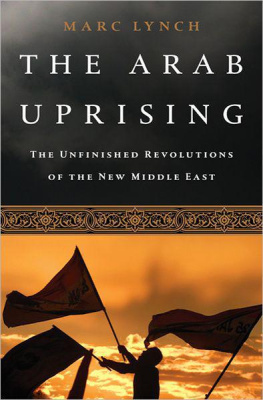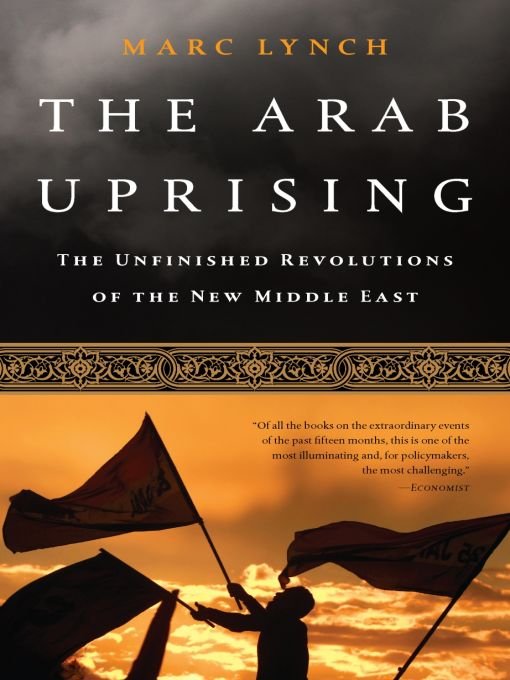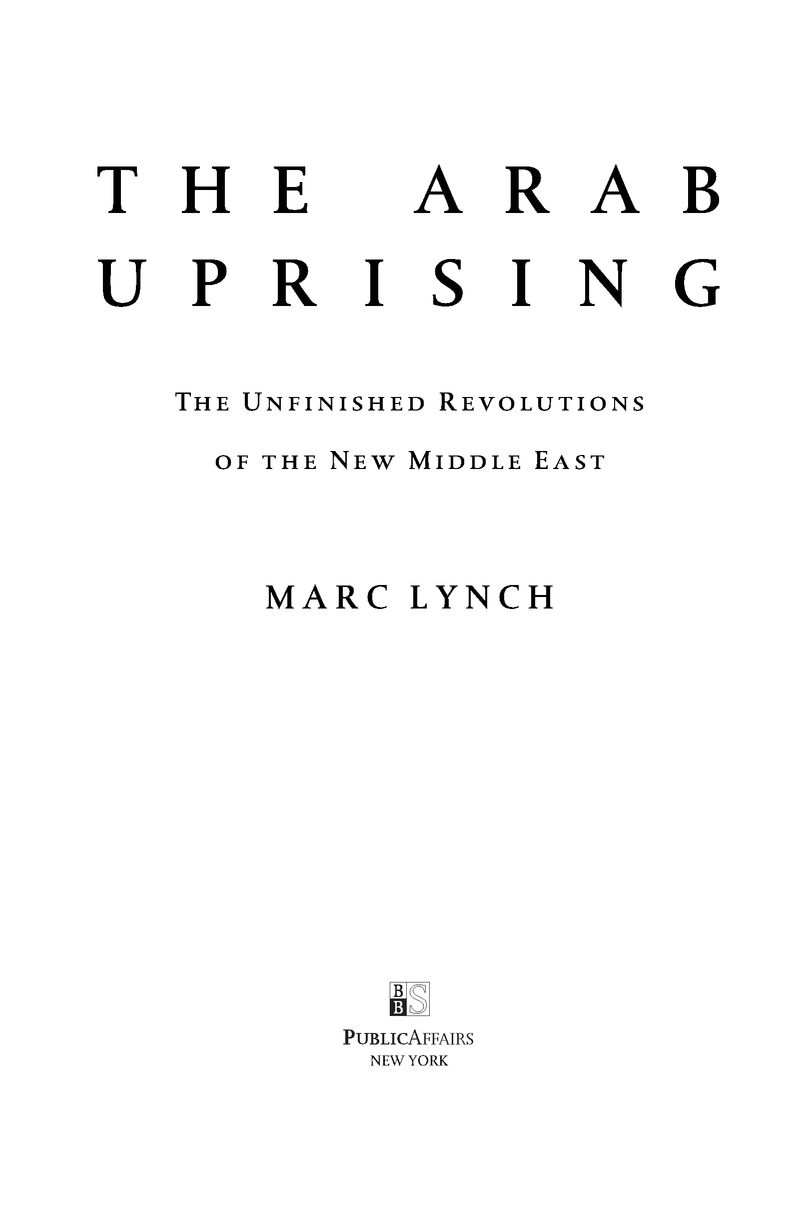Table of Contents
Praise for The Arab Uprising
Lynch has written a clear-eyed, highly readable guide to the forces in the region that gave rise to the Arab uprisings and the very real challenges they present for the U.S. Indispensably, he presents the material in a way that is neither excessively romantic about democracys chances nor excessively fearful about the greater role Islamists will no doubt play in a newly empowered Arab public square.
Washington Monthly
The Arab Uprising is a joy to read. It should appeal to a non-specialist audience looking for a nuanced and short but engaging narrative of the ongoing Arab revolts without descending into obscure academic jargon.... For scope and depth, as well as the empathy he imbues in the book, Lynch remains within the unusual bracket of scholars who possess a genuine concern, not only for his own states national interest, but also for those who have been sacrificed for it.
Madawi al-Rasheed, Middle Eastern Studies
One of the most profound books about the nature of the transformations under way, of the consciousness of the public squares and the new popular anger in todays Arab world.
Al-Ghad (Jordan)
[Lynch], who has been following recent events closely... reexamines important precedents in mass uprisings that took place in convulsive waves during the Arab Cold War of the 1950s, and were brutally suppressed... [he] also examines the key role initially played by the Al-Jazeera network in coverage of the Tunisia uprising, keenly watched by the Egyptians in convincing them their own efforts could be successful.... A timely survey of complex historical and current events.
Kirkus
A nuanced, insightful analysis of the Arab insurrections, with ample historical context.... In this thought-provoking book, Lynch earns his right to implore U.S. citizens to trust Middle Eastern countries to reshape their political space.
Publishers Weekly
Lynch, a political scientist and advisor to the Obama administration, analyzes the recent and ongoing political changes taking place in the Middle East and ventures some predictions about what may come.... Timely, informative, and recommended for current events and regional history collections.
Booklist
A wonderfully thoughtful book that captures a truly historic juncture in the Arab world. By chronicling the first volatile year of the Arab uprisings, Lynch has provided the essential guide to understanding what happens nextboth for the participants living through it and for the anxious outside world surprised by the passions unleashed.
Robin Wright, author of Rock the Casbah: Rage and Rebellion across the Islamic World
The extraordinary events associated with the Arab Spring have produced a chaotic mix of transitioning democracies, reactionary autocracies, and civil strife. But, as Marc Lynch explains in his brilliant new book, The Arab Uprising, regardless of the fate of individual rulers or the course of particular movements, the nature of politics in the Arab world has been forever transformed. A new generation has leveraged twenty-first-century technologies and tapped into a sense of interconnectedness and common identity to obliterate the old order. Nobody is better suited to navigate the reader through these turbulent waters than Lynch, one of the worlds top Middle East scholars and a pioneer in the study of new media and social activism in the Arab world. Lynch has produced the most comprehensive and balanced account yet written of the origins and implications of the changes currently sweeping this vital region. The Arab Uprising promises to remain essential reading on the subject for years to come.
Colin Kahl, associate professor, Edmund A. Walsh
School of Foreign Service, Georgetown University, and
former deputy assistant secretary of defense for the Middle East
If you read only one book about the uprisings sweeping the Arab world, it should be this one. Marc Lynch coined the term the Arab public sphere a decade before anyone in the West knew it existed and has been an active observer of and participant in it ever since. He chronicles decades of Arab protests, pan-Arabism, and Arab government repression to provide vital context for present events and draws on his deep country-by-country expertise to map future challenges for American foreign policy across the Arab world.
Anne-Marie Slaughter
For Lauren, Sophia, and Alec
INTRODUCTION
ON FEBRUARY 10, 2011, Egyptian President Hosni Mubarak stepped before the TV camera for the third time since the January 25 revolution began. Massive crowds in Tahrir Square quieted. President Barack Obama and his closest advisers turned up the television volume on al-Jazeera English. After weeks of escalating protests, tense clashes in the streets, turmoil in the ruling elite, and fierce international pressure, virtually everyone expected Mubarak to announce his resignation.
Instead, casting himself as a father to his sons and daughters, he delivered a meandering, condescending address. He assured, paternalistically, that as a president I find no shame in listening to my countrys youthbut showed no sign of having actually done so. He laid out a time line for a transition of power over seven months, which made clear that he had no intention of immediately stepping down. The hundreds of thousands of Egyptians gathered in central Cairo roared with rage.
Seconds after the speech ended, I received an e-mail from one of President Obamas top advisers on his way to a meeting in the Situation Room: What do you make of that? This book is in part my attempt to answer his question, and my own, about the dramatic changes that have unsettled so many assumptions and certainties in the Middle East.
It is commonly said that nobody predicted the upheavals in the Arab world that began in December 2010 and defined the following year. But that does not mean that nobody saw them coming. The crumbling foundations of the Arab order were visible to all who cared to look. Political systems that had opened slightly in the mid-2000s were once again closing down, victim to regime manipulation and repression. Economies failed to produce jobs for an exploding population of young people. As the gap between rich and poor grew, so did corruption and escalating resentment of an out-of-touch and arrogant ruling class. Meanwhile, Islamist movements continued to transform public culture even as Arab regimes used the threat of al-Qaeda to justify harsh security crackdowns.
Regional politics was equally stalled. The Israeli-Palestinian peace process, which remained central to Arab political identity and discourse, had long since gone on life support. Arab states seemed indifferent to its collapse, though, and even cooperated openly with Israel on the enforcement of the blockade of Gaza. In the spring of 2010, the Arabs were unable to even organize a single Arab summit meeting to discuss the problems of Palestine and Lebanon due to the bickering of the competing regimes, as Egyptian and Saudi leaders declined to travel to Doha in support of Qatari initiatives. A debilitating cold war between Americas autocratic allies and the forces of muqawama (resistance) such as Iran, Hamas, and Hezbollah dominated the official agenda of regional international relations, spreading in its wake a nasty Sunni-Shia sectarianism that divided many Arab societies. To many Arabs, the behavior of their leaders contributed to the perennial failures of the Arab order. The need for change had grown urgent and painfully obvious to frustrated youth who had long since given up any hope that their leaders might themselves change.








